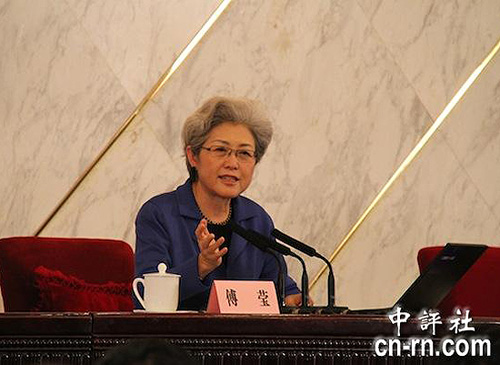An armed peaceful rise
- By Giovanni Vimercati
 0 Comment(s)
0 Comment(s) Print
Print E-mail China.org.cn, March 24, 2013
E-mail China.org.cn, March 24, 2013
 |
|
Fu Ying, spokeswoman of the National People's Congress, answers questions at a press conference during this year's NPC&CPPCC session. |
Fu Ying, the first woman to be named spokeswoman of the National People's Congress, in line with the novelty she represents, did not officially announce the 10.7 percent increase in China's defense budget as it is traditional during the annual NPC & CPPCC sessions.
The "iron lady," as she has been nicknamed by the foreign press, left state-owned press agency Xinhua to do the job. The Chinese government earmarked RMB720bn (£76.4bn) for its armed forces for the year 2013. Coming after the U.S., China is not only the second biggest economy but also the second bigger military spender. It would appear that military spending parallels economic might.
While "funds will be used to support efforts to improve the working and living conditions of officers and enlisted personnel" as the government stressed, the liberal Western media pointed to China's perceived growing military exuberance as the main reason behind the generous allocation. The ongoing dispute over the Diaoyu islands in the East China Sea between China and Japan was described as a key and critical issue justifying the increase in military spending.
China's looking scary, the occidental argument implicitly runs; it is raising its aim, becoming a threat to world peace. Apparently expansionism remains an American prerogative and the facts behind the headlines confirm this axiomatic arrogance.
It is in fact rare to hear critical voices commenting the astronomical defense budget America routinely announces every year regardless of who is sitting in the White House. Strange indeed, since the annual U.S. defense budget is always much higher than that of any other country, China included (America spent £418bn on defense in 2012). While expansionist moves on the side of the Chinese government cannot be excluded a priori, what many failed to notice is that China is not alone when it comes to maritime ambitions. Someone else seems to have nurtured similar purposes for quite a while now.
Announced back in 2011, the "Pacific Pivot," whose name unfortunately derives not from its intentions but from its geographical position, is a military initiative that is seeing 60 percent of U.S. military resources being relocated from the Middle East to the Asia-Pacific region. The excuse to go to the Middle East was to bring peace and democracy; what is the excuse today for moving their troop near China?
According to former U.S. defense secretary Leon Panetta, the geo-strategic shift is aimed at countering rising Chinese ambitions. It is unclear on what factual basis this concern is founded. How can a country that has 219 bases in the Asia-Pacific reason (as opposed to China which has none) be worried about someone else's perceived build-up is something that defies any logic. But somehow America is still worried.
Yes indeed, China is not alone, now even the hermit socialist kingdom of North Korea is rumored to be planning the wiping out of the whole of America; that at least according to the latter's worried commentators. Again, how can the most powerful nation in the world feel threatened by the frankly less-than-credible North Korean forces is another diplomatic conundrum few comprehend.
North Korea possesses the atomic bomb and is eager to test it on American soil, goes the argument. Judging from newspaper headlines in the democratic West, America appears cornered by the menacing North Korea. Is that really so? Not quite. South Korea hosts 100 U.S. military facilities, and Patriot PAC-3 missiles are also positioned in Taiwan and Japan (where America can also count on 47,000 of its troops in Okinawa). America's "enemies" are already surrounded before they have even launched their first attack; why then are they so worried? As the disproportionate balance between military presences in the area unequivocally shows, in the way of China's expansion there would already be a considerable amount of American…what shall we call them? Peacekeepers?
According to Robert Williard, head of PACOM (U.S. Pacific Command, which also happens to oversee the South Korean military), American interests in the Asia-Pacific region are of a purely "philanthropic" nature. Speaking at the World Affairs Council in 2011, Mr. Williard referred to the region as a "commons" in need of American "protection." Peculiar choice of words since the very term "commons" usually implies shared ownership, something whose utility and use belongs to a community. It might be that Mr. Williard already considers the Asia-Pacific region as part of the American community.
It is worth mentioning that those who are already paying the price of these neo-imperialist maneuverings are the local communities finding themselves in the way of military bases. Of course the damage that the arm race causes to the environment, rural communities and their daily existence is not worth discussing. What it is on the contrary worth discussing continues to be the growing threat that China would represent.
Unlike what the liberal media suggests, the recently announced increase in China's defense budget is likely to be aimed at countering U.S. concerns for the "commons" in the Asia-Pacific region.
Giovanni Vimercati is a freelance journalist and media analyst as well as a member of the Celluloid Liberation Front. @CLF_Project
Opinion articles reflect the views of their authors, not necessarily those of China.org.cn.





